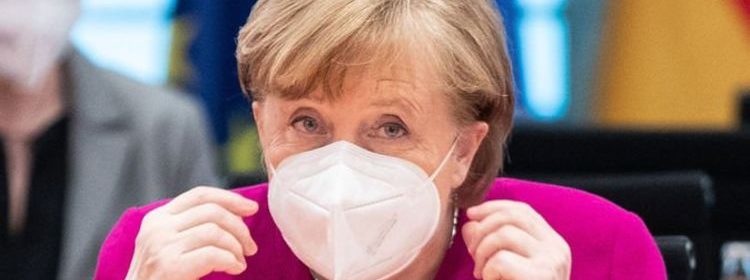What have you done, Angela? Rival turns on Merkel over mission to ‘Europeanise’ Germany

Angela Merkel: German citizen slams COVID-19 rule 'chaos'
When you subscribe we will use the information you provide to send you these newsletters. Sometimes they’ll include recommendations for other related newsletters or services we offer. Our Privacy Notice explains more about how we use your data, and your rights. You can unsubscribe at any time.
And Hans-Olaf Henkel has said her attitude is typified by Germany’s response to the coronavirus pandemic prioritising equality over speed by committing to an EU-wide approach which he further claimed has cost lives. Mr Henkel, who stood down from the European Parliament in 2019, was speaking before the passing today of emergency legislation enabling Mrs Merkel to go over the heads of regional leaders by imposing mandatory lockdowns on states with an infection rate of more than 100 cases per 100,000 people.
The number of confirmed coronavirus cases in Germany increased today by 10,810 to 3,022,323, data from the Robert Koch Institute (RKI) for infectious diseases showed.
The reported death toll rose by 294 to 78,746, the tally showed.
Mr Henkel said Mrs Merkel’s attempt to impose her will on the states was controversial, because Germany’s constitution, or Grundgesetz, is specifically intended to avoid too much centralisation of power.
It gives the regions, or laender, significant powers, at the insistence of the Allied Powers who oversaw the development of the Grundgesetz in 1948, who wanted to make sure there could be no repetition of the centralisation which led to the rise of the Nazis, and that there would instead always be a system of checks and balance in the German political system.
He told Express.co.uk: “Over the decades this principle had been under increasing attack.
“Especially Chancellor Merkel, but not only her, had abdicated more and more national responsibilities from Berlin to Brussels.”’
JUST IN: Russia playing with fire!’ Putin sent dire warning over Ukraine
The Deutsche Mark had been swapped for “one-size-fits-all“ euro which had turned out to fit nobody, Mrs Merkel had agreed to the EU borrowing money on behalf of the 19 countries in the eurozone in accordance with its £677billion coronavirus recovery plan, and most recently, she had had “abdicated” the purchase of sufficient quantities of vaccines to Brussels as well, Mr Henkel said.
He added: “Every time it turned out that the further the decision makers were away from the problems, the higher the chances that the solution found was insufficient.
“This does not mean that the German politicians would now take the lessons learned and abstain from centralising decision making.
DON’T MISS
Salmond came out in favour of Scotland joining euro [INSIGHT]
Von der Leyen on brink as German court risks recovery fund [REVEALED]
Moderna CEO brutally summed up EU’s vaccine fiasco [ANALYSIS]
They want to Europeanise more and more
Hans-Olaf Henkel
“On the contrary, they want to Europeanise more and more. In fact, only last week the German Government agreed to transfer vaccines previously allocated to Germany to other European countries although Germany herself is far behind USA, the UK, Canada or Israel.”
By demanding to centralise the response to COVID-19 by imposing lockdown, Mrs Merkel and other German politicians wanted to deflect from their failure to secure sufficient quantities of vaccines in the first place, Mr Henkel claimed.
He said: “I can see already the next step: ‘Let’s have a Europe-wide response!’”
Such a strategy ignored the fact the health crisis varied enormously from town to town, city to city and country to country, Mr Henkel stressed.
With specific relation to Germany, he explained: “No one disputes the need for lock-downs, but we don’t need one which covers the entire country when the rate of infections is vastly different within the country.”
The current discussion was complicated by two additional factors, Mr Henkel pointed out.
He said: “One: in the fall we have federal elections and the arguments about how to deal with COVID-19 are not anymore along the lines of rationale but along party lines.
“Two: the Prime Ministers of Bavaria (CSU) and of North-Rhine-Westsphalia (CDU) battle for Merkel’s succession as Chancellor.
“Since ‘more centralisation’ is popular, I am afraid that there could be an agreement that the COVID-19 Response should be more from Berlin and less from the laender.
“If it wouldn’t be for the cock-up of ordering insufficient quantities of vaccines in Brussels and the extremely slow release of new vaccines by the European Medical Agency (EMA) in The Netherlands, we would already have even seen demands that we should have a Europe-wide response.
“The underlying problem remains: Berlin and Brussels bureaucrats alike seem to believe that when it gets to the economy competitiveness is less important than social justice and when it gets to fighting COVID-19, speed is less important than equality; even if it costs lives.”
Source: Read Full Article







